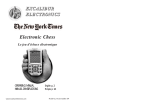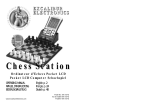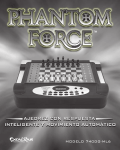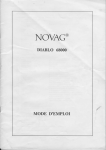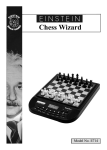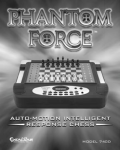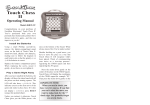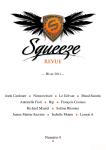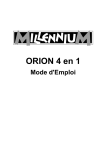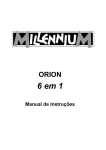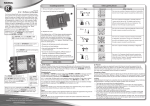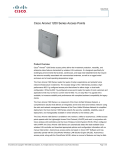Download Excalibur electronic LCD CHESS User's Manual
Transcript
EXCALIBUR ELECTRONICS, INC. 13701 SW 119th Ave Miami, Florida 33186 U.S.A. Phone: 305.477.8080 Fax: 305.477.9516 www.ExcaliburElectronics.com LCD Chess OPERATING MANUAL We make you think. English Français Deutsch Español Nederlandse correct. Replace the battery compartment panel by first fitting the two bottom tabs into their receptacles. When replacing the screw, secure it gently. LCD Computer Chess Do not force or over-tighten it. Operating Manual Play a Game Right Away After you have installed the batteries, the display will show the chess board with all the pieces on their starting squares. The LCD will also show "01 CHESS." This indicates you are at the first move of the game and ready to play chess. If it doesn't display "01 CHESS," press MODE and then NEW GAME. Congratulations on your purchase of Excalibur Electronics’ innovative LCD Chess! You’ve purchased both your own personal chess trainer and a partner who’s always ready for a game—and who can improve as you do! Install the Batteries Using a small Phillips screwdriver, remove the battery-compartment panel screw on the back of LCD Chess. Then remove the panel by pulling gently from the top. Install three fresh, alkaline AAA batteries, making sure to follow the diagram in each battery slot so that the polarity (+ or -) of the batteries is Unless you instruct it otherwise, LCD Chess gives you the White pieces—the ones at the bottom of the board. White always moves first. (For the complete rules of chess, see the Let’s Play Chess brochure included in this package.) You’re ready to play! Make your first move with your choice of two methods. In both methods, it’s very important to understand that making a move is made up of two parts, choosing a from square and a to square. Excalibur’s LCD Chess is designed so that it can be held comfortably and used with one hand. 2 English Note: Press MODE twice and it will act as a “clear” key. For example, use it to stop a square from flashing in #3 above. Moving with the DIRECTION rocker The first method makes the most of the central, DIRECTION rocker. The eight- direction rocker button may be difficult to use at first. It is different from some video game controllers because it allows diagonal movement. 4. Push the OPTIONS/MOVE button again to finalize your move. The second method of moving uses the DIRECTION rocker in only one step (2). For up, down, left and right movements, it helps if you push the button straight out away from the center of the rocker. Do not press in the center of the rocker, because you may cause a diagonal movement to occur. Moving with the NEXT PIECE and LAST PIECE KEYS 1. Select the piece you want to move by pressing the NEXT PIECE or LAST PIECE key until the piece you want to move flashes. 1. Push the DIRECTION rocker in any direction and the White queen’s rook (the piece on the bottom, left) will flash on and off. The top of the display will read "01 FROM." Then move the circular rocker button—to the right, left, or diagonally—until the piece or pawn you want to move flashes on and off. 2. Then use the center DIRECTION rocker button to move the flashing piece where you want it. 3. Finally, press the MOVE key to register your move. After you make your move, LCD Chess will reply with its move automatically. You’ll see the piece flash on its from square and move to its to square. Throughout the game, the display at top keeps track of the move number and the elapsed time for each move. 2. Push the OPTIONS/MOVE button immediately above the circular DIRECTION rocker. 3. Push the DIRECTION rocker to move the piece to the square you want. You’ll see your piece flashing on possible to squares as you move it—at the same time it continues to flash on its from square. 3 Playing the Black Pieces When you want to play the Black pieces (to let LCD Chess move first) press the MOVE button twice before you make your first move as English White. (See "Special Features and Function Keys" below.) You’ll see the White and Black pieces switch places immediately! Special Features and Function Keys Your LCD Chess partner is packed with valuable special features that can help you learn to play better and better chess—and to have a lot of fun! Draw Messages During the game, your LCD Chess will display the word “DRAW” if a three-time repetition of position occurs, or if there has been no pawn moved and no exchanges for 50 moves. When either of these situation takes place, the rules of chess state that a player can claim a draw. If you wish, you can ignore the message and continue the game. When a stalemate is reached, the display will read “STALE.” Features are controlled by the function keys—the black buttons on your LCD Chess. But there are more special features than there are keys! So each one has two labels, one above and one below. The black label below each key shows the primary function of the key. The blue label above the key shows its secondary function. Game-Ending Messages LCD Chess will announce mate in two (“MAtE2”) and mate in three (“MAtE3”). It will display “+MAtE” when executing a checkmate. When you checkmate LCD Chess, it will display “LOSE.” When you want to claim a win, draw, or want to resign—press the MODE key and then NEW GAME. You have your choice of two methods of moving your pieces. LCD Chess automatically makes its own moves! Below are the features available to you through the primary functions. Remember, to access any of these features, you simply push the proper button, looking at the black label below the key. Primary Functions (Simply push the indicated key.) 4 MODE/ON This is a special key, so both its upper and lower labels are blue. Use this key to turn on LCD Chess. Also use it to select the secondary function mode of the other keys. (See "Secondary Functions," below, page 4.) You can even use it as a clear or "escape" key to exit Your Excalibur LCD Chess is packed with features! Each key has two labels. To activate the feature named below the key, just press the button. To enjoy the feature given above the key, first press MODE/ON and then the button. any of the special modes like OPTIONS, SETUP, LEVEL, RATING, and CONTRAST. This key is used in one method of moving the pieces. Pressing it makes it “scan” left of the flashing piece to find another piece. If there is no piece to the HINT Press this key if you want to get hints from your LCD Chess partner. If the threat warning is on (see “Options During the Game”), the display shows “THRT” and the threatening move is flashed. Press HINT once more to view a tip on how to avoid the danger! left, it scans down one rank and starts scanning from the right to the left. NEXT PIECE Use this key, along with the LAST PIECE key, to move pieces. It scans right from the flashing piece to find another piece for you to move. If there is no piece to the right, it moves up one rank and starts scanning from left to right. If LCD Chess sees a hint for you, it displays “HINT” and flashes a recommended move on the screen. To make the HINT move, just press the MOVE key. Or press NEXT PIECE or LAST PIECE to select a different piece to move. MOVE Press this key to register your move, or press it twice before you register your move to switch sides (colors) with your computer. (Between presses, the display will read “FLIP.”) Also use MOVE to replay moves in the TAKE BACK mode (see "TAKE BACK,” above). TAKE BACK This key lets you take back a move or moves you’ve decided against. Press this key repeatedly to continue taking back moves. After you take back a move, you can use the MOVE key to replay the takenback move. LAST PIECE 5 OFF This turns the unit off, automatically saving a game in progress. Use you the correct moves to a problem by setting the level to 73, and then pressing the MOVE key twice. the ON key to turn the unit back on. If it is not "thinking," LCD Chess will automatically turn OFF after a period of time, saving your game position. Use the ON key to resume the game. “TRAIN”: Select one of eight training positions. Positions with the Black king in the middle give you practice in checkmating the Black king. Below are the features available to you through the secondary functions. To access any of these features, you first press the MODE key and then press the indicated button, looking at the blue label above the key. Options During the Game “TOTAL”: Your LCD Chess normally shows the time taken for each move. While in the TOTAL option, you can instead choose to have the total game time displayed. Choose “On TOTAL.” Secondary Functions (Press the MODE key and then the indicated key below. Also, press MODE to stop using a secondary function.) “SCORE”: Your display normally shows the number of the current move. If instead you want to see the piece-score of your current position, select “On SCORE.” The scoring totals the following values: Pawns—1, Knights—3, Bishops— 3, Rooks—5, and Queen—9. OPTIONS KEY Pressing the OPTIONS key repeatedly will display all selectable options. To select or change an option, use the LAST PIECE or the NEXT PIECE key. “PLAYR”: Select between: “1”— Human vs Computer; “2”— Human vs Human; “0”— Computer vs Computer. Options Before the Game Starts “OPEN”: Select one of 30 book opening lines of play. (See below, page 6.) “THRT”: When “THRT” is turned on, the threatened square will flash during the game to warn you. “GAME”: Select one of 16 Great Games. (See below.) “MATE”: Select one of 31 mate-in2 problems. Problem 32 is a matein-3 problem. If you can’t find the solution, make LCD Chess show 6 “HELP”: When this option is turned on and a hint is available, the hint from square will flash on every move. English the display contrast to one of eight setings. This allows you to compensate for differences in lighting and battery strength. “INFO”: When turned on, this option will display the score, depth of search (number of moves LCD Chess is "thinking ahead"), best move it is considering playing, and clock times. These will be displayed while the computer is thinking at its higher levels. RATING KEY LCD Chess rates your play! Use this key to view your current rating. Also use it to enter game results for a new rating if the ‘O’ symbol is on, showing you played a ratable game with no hints or take-backs. “CLRBR”: Use this option to clear the chess board for easier problem setup. Then press SETUP to enter setup mode with the chess board cleared of all pieces except a White king. OPTIONS key with RATING While viewing your rating with the “O” symbol on, this button shows “WIN,” “DRAW,” or “LOSS.” “SOUND”: Press this key to turn the sound on or off. However, error buzzes will sound even if sound is off. “WIN”—If you won the game, press the RATING key to see your new rating. Or press OPTIONS. “SLEEP”: Adjust the automatic shut off time with this key. Setting it to “0” will disable auto shut-off altogether. “DRAW”—If you drew the game, press the RATING key to see your new rating. Or press OPTIONS. “LOSS”—If you lost the game, press the RATING key to see your new rating. Or press OPTIONS. SETUP KEY Press this key to promote a pawn that reaches your opponent’s back rank to a piece other than a queen. (The promotion to a queen is the most common, so it is automatic.) You can also use this key to set up special positions, so that you can use your LCD Chess to solve problems given in books and magazines. q /n (CONTRAST) KEY Press this key repeatedly to adjust LEVEL KEY Use this key to set the level of play (for more information, see “Levels of Play,” at right). Use the DIRECTION button to change the level by one (by pushing on the right) or by ten (by pushing at the top). Also use the LEVEL key to enter level option mode. 7 OPTIONS key with LEVEL will play, and the longer it will think during its moves. With over 1,000 level setting combinations (incorporating options such as FAST, RANDOM, INFO, HELP and the training modes) to choose from, you can learn and grow with this chess computer! When the level is displayed, pressing the OPTIONS key shows: “FAST”: Uses a more selective search for thinking. In this mode, LCD Chess will play faster and look more deeply into the position. Press NEXT PIECE to turn FAST on or off. Or press the OPTIONS key again to show: The first four levels (1, 2, 3 and 4) are beginner levels and take approximately 4, 8, 12 and 16 seconds per move, respectively. Level 5 is a fixed 1-ply (one-half move) search. Levels 6 through 72 take about 1 second per level number, so level 6 will average about 6 seconds per move. The amount of time taken will vary depending on the position, the stage of the game, and whether or not the FAST level option is on. (See “Options,” pages 4 & 5.) “RAND”: Allows the computer to randomly choose between two good moves so that you get to practice and play against different responses. Press the NEXT PIECE key to turn RANDom on or off. Or press the MODE key. Additional Information and Features Screen Symbols When a “+” appears on the screen, it is a reminder that you are in check. When an “O” appears on the screen, the game you are playing can be rated. When an "=" appears, it indicates you are in two- player mode. And lastly when an “!” appears on the screen, you are being warned that one of your pieces is threatened with capture. (This is similar to the friendly "en garde" warning sometimes used by human players when they are attacking an opponent’s queen.) Levels of Play Generally, the higher the level you select, the better your LCD Chess Level 73 is an infinite level. LCD Chess will take as long to move as you want it to, or until it finds a mate position in its search. Level 73 is good for problem solving (like the MATE problems available under OPTIONS), or it can be used to play against. When you are tired of waiting, press the MOVE key while the computer is thinking, and the computer will stop thinking and play the best move it’s found so far. 8 Setup You may change any piece on the English beginning of a game, you may choose to learn one of 30 popular book openings—ways to begin the game—used by chess masters. Press MODE, then OPTIONS, to display “OPEN,” and then press the LAST PIECE or NEXT PIECE keys to select the number of the opening you want to learn. (See below.) Then press the MODE key to return to normal play. board by using SETUP. The display will show “SETUP.” Use the DIRECTION button to move the piece around the board. When setup starts, the setup piece is an empty square shown by the black color figure. To place this piece on a square, press MOVE. To change the setup piece, use the NEXT PIECE and LAST PIECE keys. To change the piece’s color, use the q /n key. When you are finished with setup, press the MODE key. When you first enter setup mode, you may also change the color of the side to move by pressing the q /n key. Now play a move. If your move is not the correct opening move, an error buzz will sound. To learn the correct move press HINT. When the computer comes back with its move, you will briefly see the word “OPEN” on the screen if you have another opening move to make. If the word “OPEN” does not appear, you may continue normal play. You have completed the training for that opening line. Auto Play If you would like to watch the computer finish a game for you automatically, push the MODE key, then press OPTIONS, until the option “PLAYR” is showing. Use the LAST PIECE key to change the number of players to zero. Press MODE to exit the OPTIONS mode. Now press the MOVE key and watch the game play itself. You may stop auto play at any time by pressing the MOVE key. Doing so will set the number of players back to one. Book Opening Trainer LCD Chess makes it easy for you to learn the same openings that world chess champions play! At the 9 Computers can sometimes "lock up" due to static discharge or other electrical disturbances. If this should happen, use a slim, pointed object to press the button marked “RESET.” pressing MODE, then OPTIONS to display “GAME,” and then pressing the LAST PIECE or NEXT PIECE key to select a game number. The names of the openings are: 1. Ruy Lopez Exchange Variation 2. Ruy Lopez Closed Defense 3. Ruy Lopez Open Defense 4. Ruy Lopez Archangel Defense 5. Giuoco Piano 6. Scotch Game 7. Four Knights 8. Petroff Defense 9. Vienna Game 10. Sicilian Defense 11. Sicilian, Accelerated Dragon 12. Sicilian, Rossolimo Attack 1 13. Sicilian, Dragon Variation 14. Sicilian, Rossolimo Attack 2 15. Caro-Kann Defense 16. French Defense 17. French, Classical Variation 18. French, Tarrasch Variation 19. Queen’s Gambit Accepted 20. Queen’s Gambit Declined 21. Queen’s Gambit, Semi-Slav Defense 22. Queen’s Gambit, Tarrasch Defense 23. Queen’s Gambit, Slav Defense 24. Nimzo-Indian, Rubinstein 25. Nimzo-Indian, Classical 26. Queen’s Indian Defense 27. Queen’s Indian, Petrosian 28. Bogo-Indian Defense 29. Gruenfeld Defense 30. King’s Indian Defense Along with the game number, you will see the position of the game after the first two moves were played. Press the MODE/ON key to return to normal play starting at move three. You take the winning side. The display will show your total great-game score in two digits (zero at the start) on the left. On the right, the display also shows the amount of points you will win if you play the correct next greatgame move. If you don’t play the correct greatgame move, an error buzz will sound and the points for this move will be divided in half. If the bonus goes to zero, the correct move will automatically flash. Most moves start with 4 bonus points, but some brilliant moves start with 8 points. The players, location, and date of the great games are: The moves and explanations of these famous openings are given in many books on chess. Great Games At the beginning of the game, you may select one of sixteen of the world’s greatest chess games by 10 1. Anderssen, A. vs Kieseritsky, L., London, 1851, "The Immortal Game" 2. Anderssen, A. vs. Dufresne, J., Berlin, 1852, "Evergreen Game" 3. Morphy, P. vs. Duke Karl & Count Isouard, Paris, 1858 English Trnava, 1986 13. Karpov, A. vs. Korchnoi, V., Moscow, 1974 14. Spassky, B. vs. Petrosian, T., Moscow, 1969 15. Fischer, R. vs. Fine, R., New York, 1963 16. Portisch, L. vs. Johannessen, S., Havana, 1966. 4. Steinitz, W. vs. Von Bardeleben, C., Hastings, 1895 5. Alekhine, A. vs. Tenner, O., Cologne, 1911 6. Gaudersen vs. Paul, Melbourne, 1928 7. Lasker, Ed vs. Thomas,G., London, 1910 8. Steinitz, W. vs. Mongredien, A., London, 1862 9. Nimzowitsch, A. vs. Alapin, S., Riga, 1913 10. Capablanca, J. vs. Steiner, H., Los Angeles, 1933 11. Botvinnik, M. vs. Keres, P., The Hague, 1948 12. Banas, J. vs. Lukacs, P., These famous games by some of the most brilliant chess masters of all time can be found, along with explanations, in many books on chess. Excalibur Electronics reserves the right to make technical changes without notice in the interest of Special Care • • • Battery Information Avoid rough handling such as bumping or dropping. Avoid moisture and extreme temperatures. Store away from windows andother direct sources of heat and cold, such as heating, air vents or direct sunlight. For best results, use between the temperatures of 39º and 100º Fahrenheit (4º and 38º Celsius). Clean using only a slightly damp cloth. Do not use cleaners with chemical agents. • • • • • • • • • • 11 • • • Do not mix old and new batteries. Do not mix alkaline & standard (carbon zinc) or rechargeable (nickel cadmium) batteries. Install batteries so that the polarity (+ and -) matches the diagrams in the battery compartment. Your LCD Chess Computer uses 3 “AAA” batteries. Weak batteries should be replaced immediately. Before changing batteries, turn the unit off. Do not attempt to recharge non-rechargeable batteries. Remove rechargeable batteries from the unit before charging them. Charge rechargeable batteries only under adult supervision. Use only batteries of the same type and equivalency. Remove exhausted batteries from the unit. Do not short circuit supply terminals. Keep the packaging—it contains important information. progress. Limited One-Year Warranty EXCALIBUR ELECTRONICS, INC., warrants to the original consumer that its products are free from any electrical or mechanical defects for a period of ONE YEAR from the date of purchase. If any such defect is discovered within the warranty period, EXCALIBUR ELECTRONICS, INC., will repair or replace the unit free of charge upon receipt of the unit, shipped postage prepaid and insured to the factory address shown at right. Français exclusion of incidental or consequential damages, so the above limitations and exclusions in these instances may not apply. Authorized Service for Your LCD Computer Chess The only authorized service center in the United States is: Excalibur Electronics, Inc. 13701 SW 119th Ave, Miami, Florida 33186 U.S.A. Phone: 305.477.8080; Fax: 305.477.9516 Ship the unit carefully packed, preferably in the original carton, and send it prepaid, and adequately insured. Include a letter, detailing the complaint and including your daytime telephone number, inside the shipping carton. The warranty covers normal consumer use and does not cover damage that occurs in shipment or failure that results from alterations, accident, misuse, abuse, neglect, wear and tear, inadequate maintenance, commercial use, or unreasonable use of the unit. Removal of the top panel voids all warranties. This warranty does not cover cost of repairs made or attempted outside of the factory. If your warranty has expired and you want an estimated fee for service, write to the above address, specifying the model and the problem. Any applicable implied warranties, including warranties of merchantability and fitness, are hereby limited to ONE YEAR from the date of purchase. Consequential or incidental damages resulting from a breach of any applicable express or implied warranties are hereby excluded. Some states do not allow limitations on the duration of implied warranties and do not allow DO NOT SEND YOUR UNIT WITHOUT RECEIVING AN ESTIMATE FOR SERVICING. WE CANNOT STORE YOUR UNIT! 12 13









